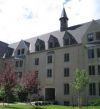TORONTO - University of St. Michael's College graduate theology courses, undergraduate classes, continuing education programs and help for students in writing labs will cease Nov. 15 unless the Catholic college at the University of Toronto can make a deal with the union representing academics who work under contract.
The Ontario Labour Board has issued a no board report and representatives of CUPE local 3902, Unit 4, claim negotiations have reached an impasse.
In a statement on its web site, St. Michael's College claims there is no impasse. Representatives of the college refused to speak with The Catholic Register about the situation.
Job security is the sticking point, said CUPE bargaining committee chair Daniel Bader. Teaching assistants and sessional lecturers work on contract of less than 12 months with no guarantee of future work, even though many have been teaching the same courses for years and the college has no plans to give those courses to higher cost full-time faculty.
"Really it's a matter of justice that when you have work that is continuous that you have employment that maps onto that," Bader said.
Academics like Bader, who teaches philosophy to graduate theology students, have trouble getting mortgages or even leases because they can't prove they will be employed beyond their contracts, he said.
The union is asking for right of first refusal if the course they are teaching is offered again.
St. Michael's College would not answer questions about how many students would be affected by a strike or lockout.
The college claims it has offered wage parity with University of Toronto for theology course instructors.
"There's a general situation in universities as a whole where an increasing amount of the work that's being done at universities is on short-term contract, even though the work is not short term," Bader said. "So you have employment that doesn't map onto the work. We're not saying that the courses need to continue. What we're saying is that if the courses continue we should continue in that work."


